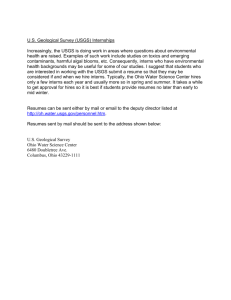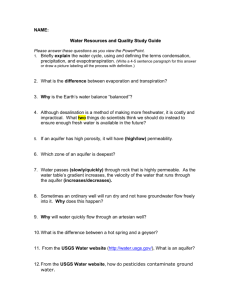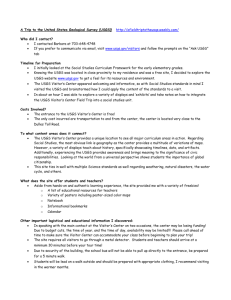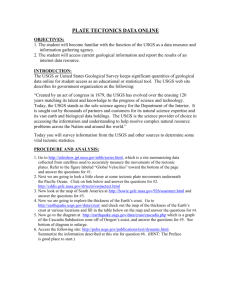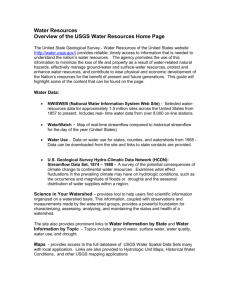What: USGS briefing to and discussion with USEPA Region 2 on
advertisement
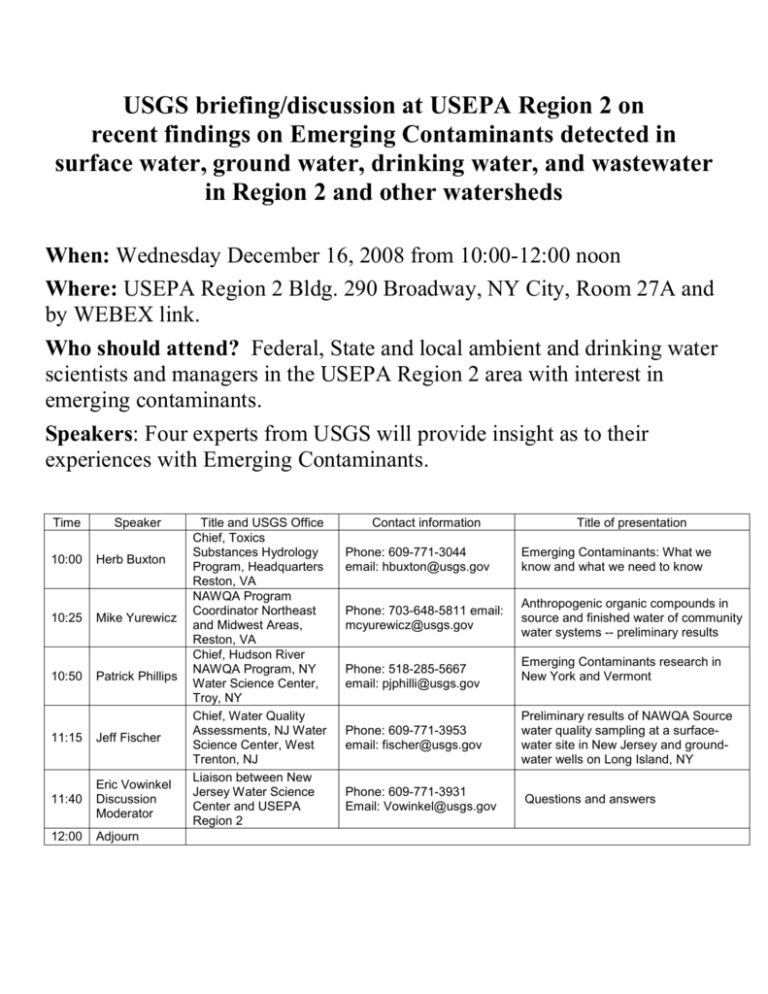
USGS briefing/discussion at USEPA Region 2 on recent findings on Emerging Contaminants detected in surface water, ground water, drinking water, and wastewater in Region 2 and other watersheds When: Wednesday December 16, 2008 from 10:00-12:00 noon Where: USEPA Region 2 Bldg. 290 Broadway, NY City, Room 27A and by WEBEX link. Who should attend? Federal, State and local ambient and drinking water scientists and managers in the USEPA Region 2 area with interest in emerging contaminants. Speakers: Four experts from USGS will provide insight as to their experiences with Emerging Contaminants. Time Speaker 10:00 Herb Buxton 10:25 Mike Yurewicz 10:50 Patrick Phillips 11:15 Jeff Fischer 11:40 Eric Vowinkel Discussion Moderator 12:00 Adjourn Title and USGS Office Chief, Toxics Substances Hydrology Program, Headquarters Reston, VA NAWQA Program Coordinator Northeast and Midwest Areas, Reston, VA Chief, Hudson River NAWQA Program, NY Water Science Center, Troy, NY Chief, Water Quality Assessments, NJ Water Science Center, West Trenton, NJ Liaison between New Jersey Water Science Center and USEPA Region 2 Contact information Title of presentation Phone: 609-771-3044 email: hbuxton@usgs.gov Emerging Contaminants: What we know and what we need to know Phone: 703-648-5811 email: mcyurewicz@usgs.gov Anthropogenic organic compounds in source and finished water of community water systems -- preliminary results Phone: 518-285-5667 email: pjphilli@usgs.gov Emerging Contaminants research in New York and Vermont Phone: 609-771-3953 email: fischer@usgs.gov Preliminary results of NAWQA Source water quality sampling at a surfacewater site in New Jersey and groundwater wells on Long Island, NY Phone: 609-771-3931 Email: Vowinkel@usgs.gov Questions and answers USGS Speaker Biographies Herb Buxton coordinates the USGS Toxic Substances Hydrology Program. The Program provides scientific information on the behavior of toxic substances in the Nation’s natural environments. He is a senior technical expert on hazardous substances in hydrologic systems and serves on numerous interagency committees, including as co-chair of the OSTP Work Group on Pharmaceuticals in the environment. He also serves as Chair of the USGS Human Health Coordination Committee, which advocates for the use of USGS environmental science for public health decision-making. Herb received a B.S. in Geology from Rensselaer Polytechnic Institute, and an M.S. in Geology from the State University of New York at Fredonia. After working as a research associate at the University of South Carolina, Hydrogeology Program, he started a 30-year career with the USGS where he has served as a scientist and manager. Mike Yurewicz has been with the USGS since 1972. A graduate of Rutgers University, he started with the USGS in the USGS NJ Water Science Center. He has held positions at the Water Science Center, Regional, and headquarters levels. Most of his work has dealt with surface water and ground water water-quality studies. He has been the Regional NAWQA Program Officer for the Northeast United States since 1994, and is located in Reston VA. Pat Phillips has been with the USGS for over 20 years, first in the Maryland District, and since 1992 in the New York Water Science Center. Pat has worked with both the NAWQA and Toxics Emerging Contaminants Programs on investigating the fate and transport of organic compounds. He has authored numerous journal articles and USGS reports. Jeff Fischer is a hydrologist with the U.S. Geological Survey and heads the Water Quality Assessment Section at the New Jersey Water Science Center. He received his BS in geology from the University of Delaware and his M.S. in hydrology from the University of Nevada – Reno. His past research has looked at the geology of the Bering Sea, isolation of radioactive waste in arid environments, and biodegradation of gasoline and chlorinated compounds. Most recently he directed the National Water Quality Assessment studies in the Delaware River Basin and Long Island-New Jersey. These studies evaluate the extent of nutrient, organic, and trace element contaminants in streams and aquifers, and their impacts on ecosystems. His current research interests include the transport and fate of organic contaminants in streams and aquifers, and the fate of organic wastewater compounds in water-treatment systems. Questions to consider regarding Emerging Contaminants (ECs) Below are some questions that the team of experts on ECs from the USGS will be prepared to answer. If EPA has any other questions, please feel free to contact me and I will share them with the expert panel and we will try to answer them during the briefing. 1. Are these USGS methods published? Could you provide the most significant references for these presentations? 2. Are the USGS EC and pesticide methods comparable to USEPA methods? If not, what are the differences between them. 3. What are the most frequently detected EC’s in surface water, ground water, drinking water, and wastewater in the USGS studies. 4. How many different compounds are detected in samples? Do the results vary regionally? 5. How do concentrations of EC’s relate to human health or ecological health criteria? 6. What would be a recommended list of EC’s and minimum reporting levels for inclusion in a drinking water monitoring program? 7. What would be a recommended list of EC’s and minimum reporting levels for inclusion in an ambient monitoring network like the National Water Quality Monitoring Network for Coastal Waters and Their Tributaries? 8. Do current results suggest that wastewater treatment plant processes reduce concentrations of ECs from surface-water sources? 9. What research is going on now? What questions are researchers at USGS trying to answer? 10. What research is USGS considering in the future? 11. Are any EC studies being conducted in the USEPA Region 2 areas in the Caribbean? 12. What research is USEPA currently conducting and where can we find out more about these studies?
